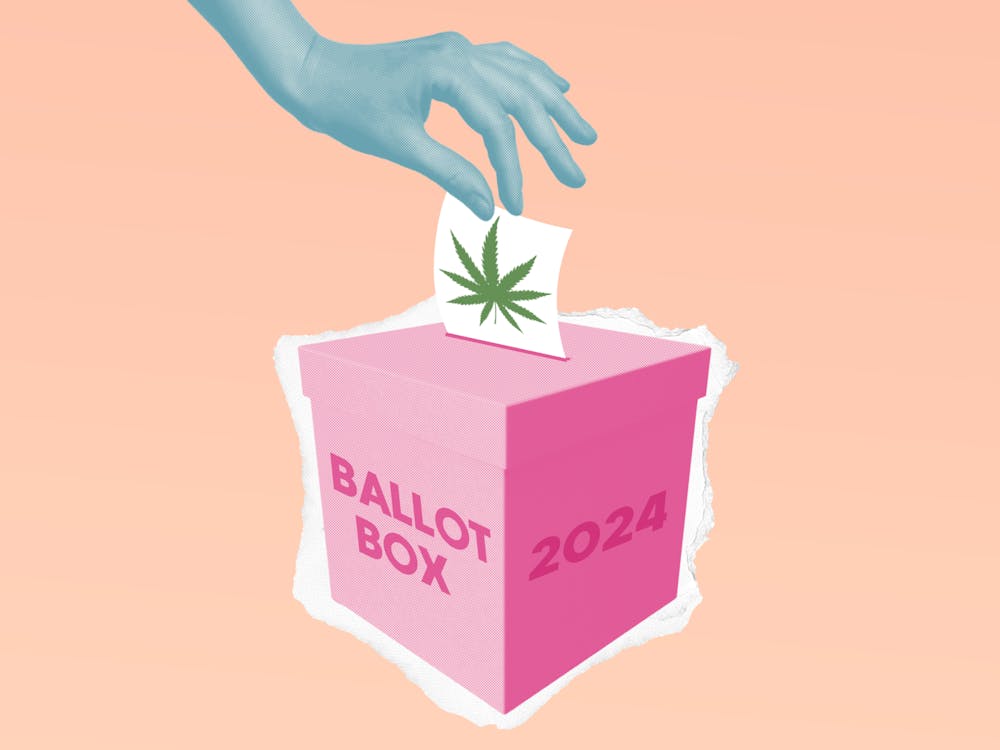Craving relief from her anxiety, Addie Sptaru, a 19-year-old UF psychology sophomore, found medical marijuana was her solution.
Sptaru has seen positive results in her day-to-day life from using cannabis, she said. She thinks other adults should have access to marijuana as well.
“I don't see any reason that alcohol should be legal, but marijuana shouldn't,” she said. “There are things that are potential dangers with it [marijuana], but I think a lot of it is fear-mongering and not something that's actually as big of a deal as it's made out to be.”
Sptaru intends to vote in favor of Amendment 3 in November.
If passed, Amendment 3 allows adults 21 years or older to possess, purchase or use marijuana products recreationally. The amendment would allow recreational possession of up to three ounces. To gain ballot access, the amendment was approved by the Florida Supreme Court on April 1 and acquired over 1 million voter signatures.
The amendment must have 60% approval at the polls in November to pass. Recent polls show the referendum passing by a narrow margin; 64% of voters approve the amendment, according to a recent poll by Emerson College.
In Alachua County, stakeholders have concerns over the potential impacts if the amendment gains citizen approval.
Legal concerns
In Florida, it’s a crime to possess any amount of marijuana without a medical card. Melanie Slaughter, a criminal defense attorney in North Central Florida, has defended clients with cannabis charges.
Slaughter said she often advises clients who are faced with marijuana charges to get a medical card because it's relatively easy to get if diagnosed with a recognized qualifying condition, including anxiety, cancer, epilepsy and HIV.
On first offense, clients possessing marijuana without a medical card are normally sentenced to diversion programs, like community service, Slaughter said. Jail time for marijuana usage usually only results after multiple offenses.
Yet testing for marijuana usage in cases such as DUIs can be murky, she said. Marijuana can remain in a user’s system for up to a month, leading them to test positive on drug tests even if they’re not actively under the influence.
With the passage of Amendment 3, individuals convicted of marijuana usage or possession could be serving time for a crime that no longer exists. The legal community is uncertain about what would happen to those currently incarcerated on marijuana possession if the amendment were to pass, Slaughter said. She hopes the amendment is able to benefit her clients by offering a pathway to those with marijuana-affiliated charges to have their records cleaned, she said.
However, Slaughter finds the legalization of cannabis personally concerning because of how the drug affects the attitude and motivation of users, she said. As a defense attorney, she sees every day how for her clients marijuana can become a “gateway” to poor life choices.
“It takes away people's ambition to do anything,” she said. “They just exist in a haze of smoke, and it's just not a productive way for a society to allow people to live.”
Possible upticks in DUIs are law enforcement’s biggest concern with Amendment 3, said Art Forgey, a spokesperson for the Alachua County Sheriff’s Office.
Alachua County has a relatively low rate of marijuana-related DUI cases, he said, but there’s a possibility after the referendum there might be people who don’t understand their personal limits.
“In a [alcohol] DUI case, you have a breathalyzer that you can give that person,” he said. “With marijuana, there is no instrument like that that would gauge it.”
In the case of a potential marijuana DUI, a field assessment would have to be done based on sobriety tests and visible driving impairment, Forgey said. If the amendment passes, there’s still uncertainty on what regulations the legislature would implement on recreational usage, leaving many questions up in the air, he said.
Medical regulations
Alachua County has more than 20 marijuana dispensaries that can only distribute to customers with medical cards. It’s unclear how the medical marijuana community could be impacted by the legalization of the drug, said Aaron Bloom, CEO of DocMJ, a licensed medical marijuana physician practice in Florida.
Over 800,000 Floridians have medical marijuana cards. These cards can only be given by certified physicians after determining that a patient has a qualifying condition under the law. Bloom said it’s the job of licensed physicians to decide whether the benefits of marijuana outweigh the risks before legally providing a recommendation.
Medical risks of marijuana usage can include addiction, pregnancy risks, permanent IQ loss and impaired athletic performance, among others. Benefits are pain regulation, nausea control and an increased appetite, according to the U.S. Department of Health and Human Services.
If a doctor believes that cannabis would be beneficial for a patient, they are given a
recommendation and put on the state registry, he said. Patients then have to pay a fee to the state and get a card for medical marijuana usage. Patients with a card are then able to purchase at any Florida-licensed dispensary, as long as they pay reregistration fees every cycle.
“My concern [with] Amendment 3 is that for the last eight years, we have built a very successful medical marijuana program in Florida,” Bloom said. “My concern is that those products [medical marijuana] will no longer be available.”
After recreational use was made legal in other states, Bloom said, there was an increase in dispensaries gearing products towards the recreational market, which has a higher profit margin and can sell for a higher price.
There are differences between the type of marijuana used for medical and recreational products, Bloom said. Medical marijuana is normally prescribed with higher CBD, which is less impairing, and lower THC levels, which is a psychoactive that leaves the user feeling “high.” Bloom said the recreational market craves the psychoactive properties of marijuana, which may lead to more strains with higher THC being sold. This is less suited for the medical market, Bloom said.
“The dispensaries can only grow so much product, they can only process so much product,” he said. “I’m fearful that the patients will get lost in the shuffle.”
Millions of dollars have been spent on Florida’s “Yes on 3” campaign, with one of the largest donors being Trulieve, a common medical marijuana dispensary. The company has already donated $95 million to the initiative, Trulieve spokesperson Steven Vancore said.
Recreational marijuana will implement regulations that will make cannabis possession safer, Vancore said. Most illicit cannabis confiscated by law enforcement contains dangerous additives from illegal pesticides, but Amendment 3 would require cannabis to be distributed by licensed growers.
The recreational market will also bring tax revenue on all recreational marijuana that is sold in the state, he said, which will stimulate economic growth. If the amendment passes, Vancore said he hopes the legislature will enact laws to limit public smoking and consumption, on par with the laws already existing for tobacco and alcohol.
“We see that a majority of adult Americans currently have the freedom to choose to possess and consume safe lab-tested marijuana without fear,” he said. “It's time that Floridians in the Freedom State also enjoy that freedom.”
Contact Morgan Vanderlaan at mvanderlaan@alligator.org. Follow her on X @morgvande.
Morgan Vanderlaan is a second year political science major and a Spring 2025 metro general assignment reporter. She has previously worked on the enterprise desk as a political reporter and on the county and city commission beat. When she's not on the clock she can be found writing, reciting and watching theatre!






